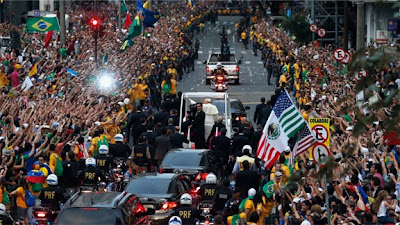1.5 million youth ignore heavy rains to rock with Pope at Copacabana beach Mass - The Man they call Papa!
The American media seems
adverse to covering "feel good" stories but at least the rest of the
world can learn with amazement the incredible journey Pope Francis is making to
Brazil
Check out the video from The Telegraph in the UK. At least the rest of the world see the news value.
Barely a word was
mentioned about the Pope's first international trip on network or cable news
and that is a sad testament to the nature of stories that reach the
people. Oh our news media showed the
Pope in the ghettos of Rio and tried to say
the story was all about the failure of the rich to help the poor.
But the message had
nothing to do with failure and everything to do with faith, and a Catholic
Pope's plea to have faith in God and Jesus Christ is the last thing you will
hear from a liberal media in America
How sad but how
typical. The Pope is in South America
pleading the cause for ALL poor and rich people, the need for faith in a higher
cause, from a loving God, while in America
our politicians are holding a Conference on Violent Crime in Chicago
Pope Francis focuses
attention on prayer and faith for all while American politicians focus
attention on gangs and murder on the streets of our cities. In Brazil
1.5 million youth, yes the same age as those in gangs and committing murder in America
How strange for the media
to not notice such a massive movement in our Southern Hemisphere. How odd to not cover a story that affects
over 1.2 billion Catholics around the world, the largest single religious
denomination in the world and in America
When it comes to media
coverage the Pope is truly a voice in the wilderness because the networks have
not figured out how to make God or faith into a reality show so they can make
money.
People of all faiths have
a right to know there is one world leader walking the walk and talking the talk
when it comes to laying his life on the line for his love of all people and
belief in the power of prayer and faith.
There are rare times in
the history of mankind when one solitary voice can make a difference. Pope Francis may very well be one of those
people whose genuine love, compassion and empathy for giving transcend ego,
power and greed for taking.
Politicians and people
from Wall Street to Main Street
.













































